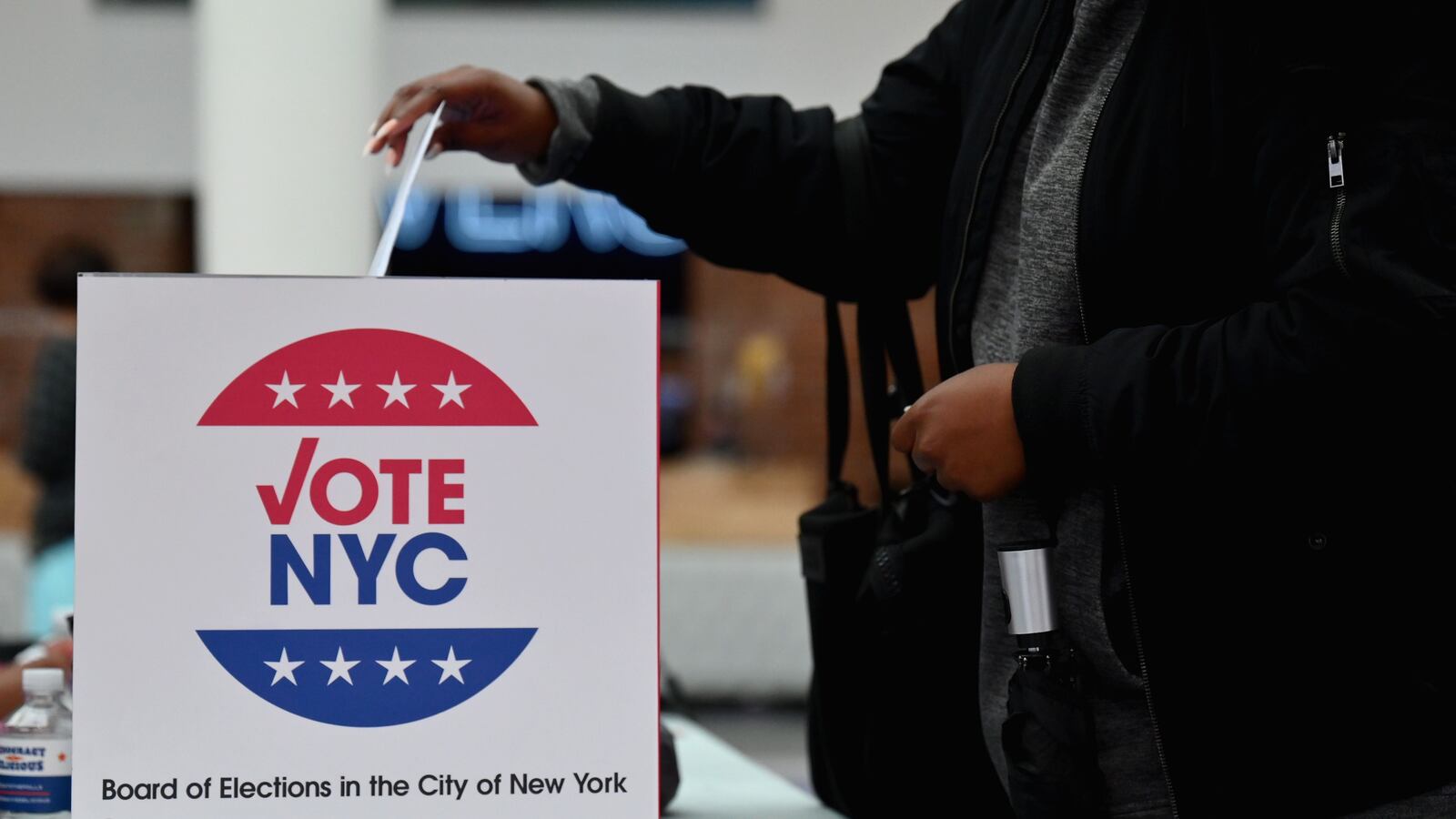They aren’t all old enough to cast their ballots, but the teenagers Chalkbeat spoke with are clear on what’s at stake for them this Election Day. The response to COVID-19, voter suppression, police violence, and LGBTQ rights are driving their work to get their parents, old-enough friends, and other New Yorkers to vote.
“If you go on TikTok or you go on Twitter or you go on Instagram, you see these comments. ‘You can’t even vote. Why do you care?’ We have to erase that notion, ” said Leonel Ramirez, 17, of Brooklyn.
Ramirez, who is a senior at Food and Finance High School in Manhattan, is active in YVote, a nonprofit that gives students opportunities to talk politics and learn how they can make a difference, regardless of their age or immigration status. (YVote’s founder, Sanda Balaban, is a member of Chalkbeat’s reader advisory board.)
In recent months, YVote participants have made scorecards for assessing candidates on issues such as racial and climate justice, created public service announcements, and reached out to voters.
“For people I can get through to, I kind of just walk them through the process: how to register, how easy it is,” said Kenisha Mahajan, a 15-year-old who lives in Queens and is a sophomore at Stuyvesant High School in Manhattan. “I just try to get them as involved as possible. I tell them: You can become a poll worker or do phone banking.”
What follows are excerpts from our interviews with New York City teenagers about their political awakenings and why this election matters to them.
These interview excerpts have been lightly edited for length and clarity.
Born a day late
Karla Sterrett, 17, Bronx, New York
Freshman, City College of New York, Manhattan
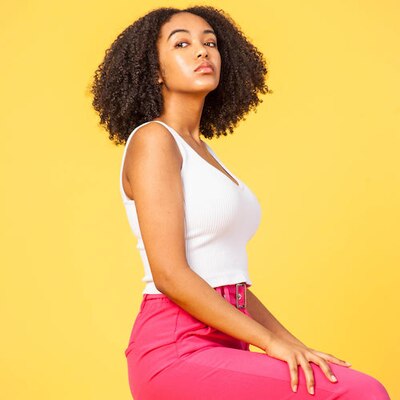
I’m 17 right now, and Nov. 4, literally the day after Election Day, is my 18th birthday. I went with my mom to vote and was looking over the ballot, and I was just like: Isn’t there some way [for me to vote]? Then I read it and was like, yeah, I’m not going to jail! Don’t want to do that!
During the 2016 election, I was a freshman. Seeing everyone’s faces and just viewing everyone’s energy — the election felt so vital and important. I didn’t really grasp it. I thought: It doesn’t really involve me, I’m so young, this doesn’t matter.
But since I joined YVote in 2017, I’ve been on this crazy train of wanting to try to educate others about voting rights, Black people’s rights. Learning about voter suppression definitely altered my mindset.
Throughout history, Black people had to take extremely hard tests just to prove we should be able to vote. There are still so many barriers, especially for Black people, people who are incarcerated, people who are immigrants. It’s an ongoing fight to show we are citizens of the U.S. There needs to be more talk around this.
On Election Day, I’m going to be spreading resources to people who are voting on Nov. 3 and trying to rush to the polls. We’re not going to know [the election results] on Nov. 3 because of all of the absentee and mail-in ballots. Whether it’s a Trump rally or Biden supporters, there’s going to be friction, so I’m just advising people to be careful.
‘It’s pretty tough to be a conservative’
Isaiah Taylor, 17, Queens, New York
Senior, Benjamin Franklin High School for Finance and Information Technology, Queens
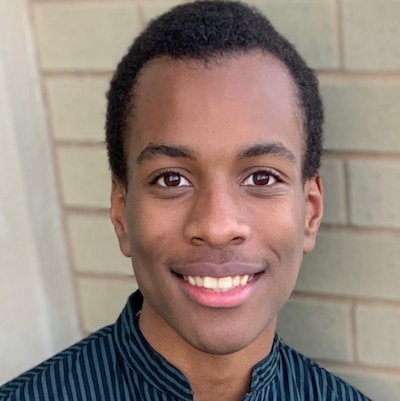
This will be my first election season remotely politically involved. Before this, I had a natural interest in politics and already considered myself conservative.
Right now [the issues driving me] are voter integrity, voter suppression, COVID response, and domestic policy toward inequality. It’s a good first step that both of our presidential candidates are speaking toward racial injustice issues and proposing different policy changes.
I have a strong, strong passion for foreign policy. I just wrote a paper for my AP government class about how imperative it is that everybody knows what’s going on outside of the United States. I’m pretty sure the general American public doesn’t know the Intermediate-Range Nuclear Forces Treaty that was originally instated by President Ronald Reagan was recently suspended. People don’t know about the [clashes between] Armenia and Azerbaijan.
At school, it’s pretty tough to be a conservative. People say, ‘Oh my God, you are conservative — do you support this candidate?’ I’m like, ‘No — just because I’m in a certain party doesn’t mean I support a specific candidate.’ People will attack you and say you’re racist or you’re sexist. I say to them: It’s really stupid to generalize all of Republicans or conservatives because you were making the argument that certain minorities should not be generalized. So why were you generalizing me and the rest of the people in my party?
Even my family members are taken aback that I am a Republican. My mother identifies as independent and my dad is a Democrat. It was really tough to develop that individuality, instead of saying I’m a Democrat because everybody else is.
Immigrants: our voices matter
Kenisha Mahajan, 15, Queens
Sophomore, Stuyvesant High School, Manhattan
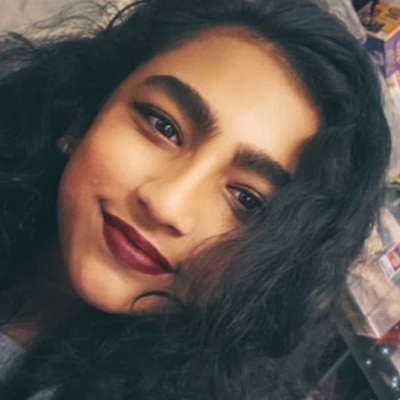
I grew up in India and moved here around third grade. Obviously, as young people, we feel really limited because we can’t vote yet. Even though my family can’t vote, I try to encourage people we know to vote.
I know a lot of family members or friends who are just over 18 or in college, and they don’t know much about voting. A lot of them weren’t really exposed to that, or they come from immigrant families. And one thing I’ve seen in immigrant families is there’s kind of this belief that your voice doesn’t really belong and that voting isn’t going to make a difference.
For people I can get through to, I kind of just walk them through the process: how to register, how easy it is. I just try to get them as involved as possible. I tell them: You can become a poll worker or do phone banking. There are quick and easy ways to get involved.
What they’re saying on TikTok
Leonel Ramirez, 17, Brooklyn
Senior, Food and Finance High School, Manhattan
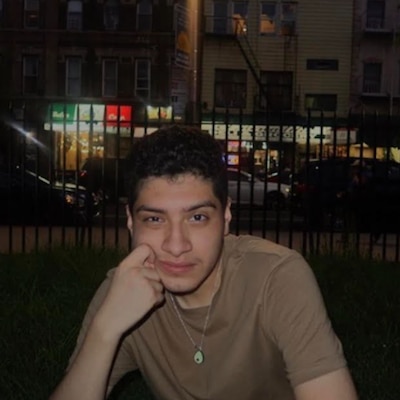
Four years ago, when the Donald Trump and Hillary Clinton election was happening, I actually ran for my school presidency that same week. I had lost the presidency and no one wanted Donald Trump to win, regardless of how young we were. Especially coming from a first-generation family — my mom is Mexican-American and my dad is from El Salvador — it was not a fun time. I remember the next day, in homeroom, no one was happy with the results. Teachers are supposed to be very neutral. They aren’t supposed to tell you their politics, but you could see where they stood. It was a very gray ambiance.
In the past, if I’m being totally honest, elections have never been a priority for me. I kind of watched it from afar, whether it be through YouTube or through my friends or what my parents were saying, but it didn’t seem like something that concerned me. Within the LGBTQ community, you think, I’m still young; I’m part of Generation Z; this has nothing to do with me.
If you go on TikTok or you go on Twitter or you go on Instagram, you see these comments. ‘You can’t even vote. Why do you care?’ We have to erase that notion.
Looking back on it now, it does affect me. The majority of my friends are queer identified, so I’m taking that into account. Can I walk down the street without being called a slur? Can my friends choose the bathroom they want to use? Are my transgender friends going to have the acknowledgment they deserve? Just because marriage isn’t a prospect for us right now, doesn’t mean that six years from now we’re not going to want to. It’s not enough to say. ‘I’m an ally’ or to stay in the range of ‘I have gay friends.’ You have to be anti-homophobia. You have to be anti-hate crime. Just like in the Black Lives Matter Movement, you can’t remain complicit because the voices in the room are not always reflective of the voices in America.
George Floyd inspired me to get involved
Kiara Green, 17, Brooklyn
Junior, Achievement First Brooklyn High School
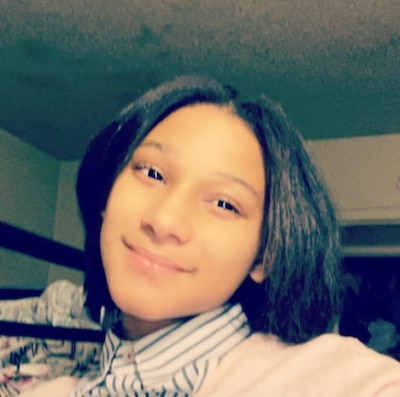
I was never interested in politics. During coronavirus, when we were in quarantine, when George Floyd [was killed], my school gave us a day off if you wanted to make a change or voice how you’re feeling.
I wanted to be engaged in politics. There are always people saying: Oh these youths don’t do anything. They’re always on the streets. Gangs and everything. I don’t want to be in that stereotype category. I wanted to get out of my comfort zone.
Right now, I’m in the process of becoming a poll worker, though they’re taking so long to email me the link to train. I’m confused whether I’m in it or not, so I’m crossing my fingers. My mom says I’m a workaholic. I have no time to rest.
Helping my parents navigate the news
Michelle Del Villar, 18, Bronx
Freshman, City College of New York, Manhattan
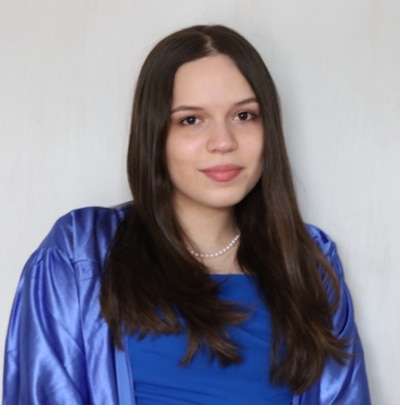
I came to the U.S. from Spain five years ago, so I’m a first-generation immigrant. I can’t personally vote. By being involved and spreading information, I can make my voice count and allow people to understand what’s happening.
My family members, they barely speak English. Most of them speak Spanish. There are a lot of limitations and obstacles for them. They rely on two main channels on TV that are in Spanish, and they are really biased. When my parents are watching the news, they’ll say: I saw this. And I have to explain. On Election Day, I’ll be trying to convince my family members who can vote to vote.
Also, something really important during this election is mental health. These are really uncertain times due to the pandemic and the election, and [some] people don’t have access to mental health services or don’t have people to talk about it. Establishing that safe space with someone who seems to be really worried about the election, just to talk about it with them, is really important.
‘Are you registered to vote?’
Bianca Peterkin, 16, Bronx
Junior, Bronx Early College Academy For Teaching and Learning
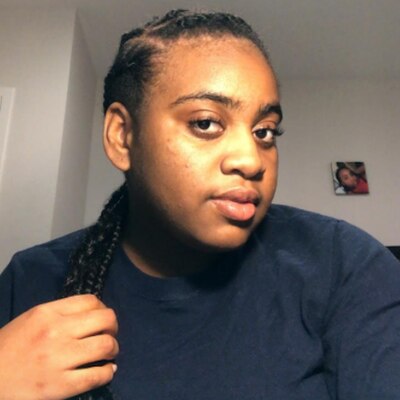
I saw this video by [the rapper] YelloPain called, “My Vote Don’t Count.” He says, a lot of people say, “My vote doesn’t count,” but they don’t really know about the election. I realized, I need to know what I can do.
I’ve been learning more. In our racial justice group, we talk about education, health care, affordable housing, police brutality, COVID-19. We only focus on the presidential elections, but we don’t realize the Senate and all these other elections are also important.
YVote linked me to the New York Immigration Coalition. They do text banking and phone banking. I joined in the beginning of October. We text and ask people: Are you registered to vote? If they’re not registered, you can send them the link.
Another member and I also worked on a racial justice scorecard. You can check it off if candidates meet the criteria. We focus on the issues that touch on racial justice: education, health care. Police brutality is another issue, still occurring after all these years.
Now, my mom and my sister come to me, asking: Where do I go for my early poll site? They both voted early.


